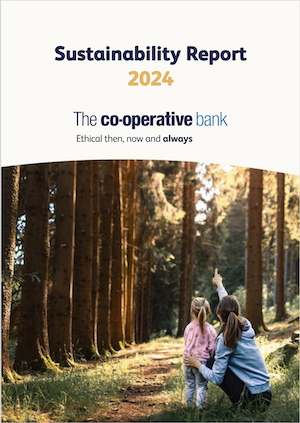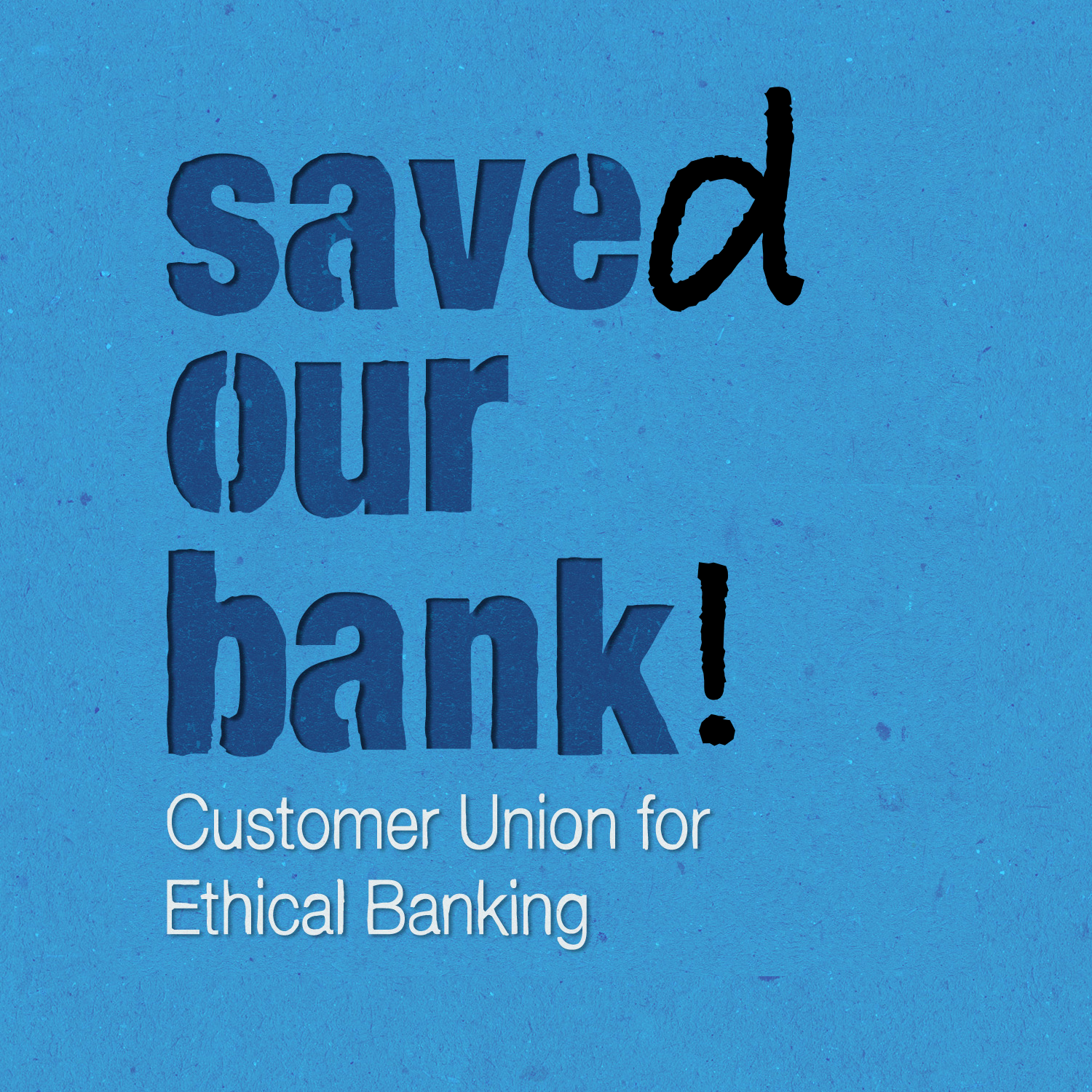Welcome to this April 2025 newsletter from the Customer Union for Ethical Banking, the independent union for customers of The Co-operative Bank.
This month we’re taking a closer look at the bank’s climate commitments from its new Sustainability Report, and also reflecting on renewed pressure on banks to increase financing for the arms trade.
Why the Co-op Bank’s pioneering approach to the arms industry remains relevant today
With the second Trump administration having thrown the entire post-war Atlantic alliance into doubt in recent months, Europe is rushing to increase defence spending. And since Russia’s full-scale invasion, there has been broad cross-party support in the UK for sending military hardware to support Ukraine. This has resulted in calls for banks to increase their support for the armaments industry, not just from the industry itself, but also recently from a group of over 100 Labour MPs. The Labour Growth Group has called on banks to "rethink ESG mechanisms that often wrongly exclude all defence investment".
 It’s worth noting in this context that, while the Co-op Bank has had a position on the Arms Trade since it first launched its Ethical Policy in 1992, this has never excluded all finance for the defence sector. Rather, the bank’s policy – based on customers’ ethical concerns – focuses on excluding companies involved in the supply of armaments to oppressive regimes, as well as the supply of indiscriminate weapons like cluster munitions and nuclear weapons. This is a policy that envisions a world where the defence industry pays attention to ethical questions, and is focused on ensuring open, democratic societies are able to defend themselves.
It’s worth noting in this context that, while the Co-op Bank has had a position on the Arms Trade since it first launched its Ethical Policy in 1992, this has never excluded all finance for the defence sector. Rather, the bank’s policy – based on customers’ ethical concerns – focuses on excluding companies involved in the supply of armaments to oppressive regimes, as well as the supply of indiscriminate weapons like cluster munitions and nuclear weapons. This is a policy that envisions a world where the defence industry pays attention to ethical questions, and is focused on ensuring open, democratic societies are able to defend themselves.
Of course, in the real world, many arms companies fail to ensure that their products don’t end up in the hands of oppressive regimes. If defence firms are genuinely being “held back by ethical banking standards” as they say they are, maybe they should consider addressing this, rather than demanding banks drop human rights based standards.
The banking sector’s “net zero” commitments are crumbling
This month, the Net Zero Banking Alliance (NZBA) – a major initiative established by Mark Carney four years ago and supported by over 120 banks – voted to abandon its 1.5 degrees climate goal in favour of a more “flexible” approach. This major backwards step was a response to an exodus from the initiative from US, Canadian and Japanese banks, who considered it too tough (although it still left room for all these banks to keep piling money into fossil fuels). Now, climate leader Triodos Bank has left the initiative, criticising it for being too weak – a decision we find understandable and admirable in the circumstances.
The Co-op Bank is currently not a member of the NZBA, but it has in the past publicly expressed its intention to join. Given the weakening of the initiative, it looks like a good time for the Co-op to respond by strengthening its own climate ambitions rather than joining an initiative which is retreating into irrelevance.
Climate in the bank’s Sustainability Report
 As we reported last month, the Co-op Bank has a new Sustainability Report out, and the context at the NZBA is a useful backdrop to take a look at the bank’s own climate commitments.
As we reported last month, the Co-op Bank has a new Sustainability Report out, and the context at the NZBA is a useful backdrop to take a look at the bank’s own climate commitments.
For background: the Co-op has refused to finance companies involved in oil, gas and coal extraction since way back in 1998, on climate grounds, and should be seen as a climate pioneer for this. However, as we’ve said in the past, it failed to keep track with the rest of the sector in setting targets to reduce its 'financed emissions' and has been playing catch-up recently.
The bank finally set a commitment in 2023 to reach net-zero financed emissions by 2050, and last year it reported on its financed emissions for the first time. This is of course a necessary first step towards reducing them. It also committed to “commence development of a robust Net Zero Transition Plan” in 2024.
However, the bank’s 2024 reporting doesn’t have a great deal more to offer. We said last year that we were looking for the bank to develop strong interim targets, and for the bank to scale up its ambition and set a net-zero deadline much sooner than 2050. Sadly, we don’t see any sign of improved interim targets – the bulk of the bank’s financed emissions come from its mortgage provision, for which no interim target has yet been set. And while the bank has published a “summary and key roadmap” of its transition plan in the report (p10 and 11), the full plan doesn’t seem to be available.
 Our hope is that progress will come from the bank’s new owners, which seem to have more ambitious climate standards, including reaching Net Zero by 2040. We hope this target will be applied to the Co-op Bank’s operations as well.
Our hope is that progress will come from the bank’s new owners, which seem to have more ambitious climate standards, including reaching Net Zero by 2040. We hope this target will be applied to the Co-op Bank’s operations as well.
We’ll be talking to the bank about all this in more detail when we meet with them at our first quarterly meeting of the year next week.
The Customer Union’s role in “saving our bank”

 Lastly, the new issue of Ethical Consumer magazine is a banking special, and includes an article from Ethical Consumer editor and Customer Union director Rob Harrison telling “the inside story of the Customer Union’s own small role in "saving" one the UK's most iconic ethical brands.” Check it out here, and feel free to share to help spread the word!
Lastly, the new issue of Ethical Consumer magazine is a banking special, and includes an article from Ethical Consumer editor and Customer Union director Rob Harrison telling “the inside story of the Customer Union’s own small role in "saving" one the UK's most iconic ethical brands.” Check it out here, and feel free to share to help spread the word!
Save Our Bank = Customer Union
 A reminder that with the Co-operative Bank back in mutual ownership we're retiring the Save Our Bank name - in use since we started the campaign in 2013.
A reminder that with the Co-operative Bank back in mutual ownership we're retiring the Save Our Bank name - in use since we started the campaign in 2013.
Our website is now at:
https://customerunion.coop
And we have a new contact email address:
[email protected]
The old ones still work though.
On Bluesky? Follow us there!
 Since Elon Musk has ruined Twitter, we’ve switched over to Bluesky. If you have an account, come follow us! Even better, why not share your thoughts on this newsletter there and tag u
Since Elon Musk has ruined Twitter, we’ve switched over to Bluesky. If you have an account, come follow us! Even better, why not share your thoughts on this newsletter there and tag u
That’s all for this month’s newsletter; thank you as ever for reading and supporting the Union.
With best wishes,
The Customer Union team
Have you joined the Customer Union yet? It costs £15 a year to be a member of the first ever customer union co-operative, and help us ensure the Co-op Bank sticks to its principles. We also welcome Coventry Building Society members. It only takes a few moments to sign up here.




